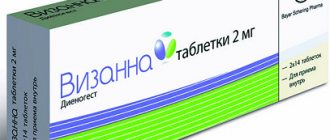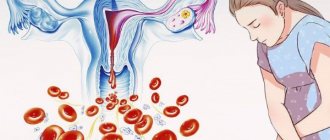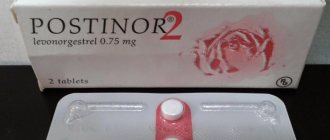Postinor is the most popular modern drug that helps prevent unwanted fertilization of the egg and further pregnancy. There are no similar emergency contraceptive drugs in the world.
Postinor is an emergency contraceptive that is used after unprotected sexual intercourse. Postinor is based on the main active ingredient – levonorgestrel. The main substance of postinor is a synthetic hormone that inhibits the process of conception at the very initial stages or completely prevents the further development of the fertilized egg, so pregnancy does not occur. Typically, postinor, as an emergency contraceptive aid, is taken after unprotected sexual intercourse or in case of ineffectiveness of other contraceptive methods used.
After taking Postinor, a delay in menstruation is often possible. This drug, due to the synthetic hormone, has a strong effect on the general hormonal background of the female body. Taking into account the pharmacological fact described above, the number of times postinor is taken is strictly limited, no more than once a month. Otherwise, side effects often occur - severe abdominal pain, sudden intermenstrual bleeding, dyspeptic syndrome, vomiting, nausea, absence of menstruation despite a negative pregnancy test, etc.
The mechanism of action of Postinor on the woman’s body
Postinor is a synthetic progestin drug with a contraceptive effect. The effect is due to antiestrogenic and gestagenic properties. When taking the medicine in the first phase of the cycle, the active substance suppresses ovulation and prevents fertilization. There are also characteristic changes in the endometrium that do not allow the fertilized egg to attach to the uterine wall.
Important! Postinor is not an effective treatment after implantation.
Postinor belongs to the so-called emergency contraception drugs. This means that it is used after sexual intercourse in the absence of contraception as such or if the contraceptive was ineffective. The need to take it may arise if the integrity of the condom is damaged.
The necessary contraceptive effect is due to the content of high doses of hormones. The main active ingredient in the drug is called levonorgestrel. Auxiliary components include:
- potato and corn starch;
- lactose monohydrate;
- talc;
- magnesium stearate;
- colloidal silicon dioxide.
Each package contains 2 tablets of the drug.
Levonorgestrel causes certain changes in the functioning of the organs of the reproductive system:
- inhibition of ovulation due to the lack of maturation of the egg and its descent into the fallopian tube;
- reduction in the speed of sperm and their ability to fertilize when penetrating the genital tract;
- stimulation of endometrial development and its subsequent rejection.
The contraceptive effect is due to the properties of the synthetic hormone included in the composition. A few days after taking the drug, bleeding is observed. Their average duration is up to 5 days.
Attention! Bloody discharge indicates the effectiveness of the tablets. To completely rule out pregnancy, it is necessary to perform a rapid test.
Pregnancy is prevented in approximately 85% of cases. The effectiveness of contraception depends on the time interval between sexual intercourse and taking the pills:
- 95% – within the first day;
- 85% – during the second day;
- 58% – third day.
That is why you should take the pills as quickly as possible. The more time has passed since sexual intercourse, the lower the contraceptive effectiveness.
Attention! The drug is effective only for 72 hours after unprotected intimacy.
Best answers
cassandra:
Do not conduct such experiments, this is not a joke. Postinor is a hormonal drug that should be used only in isolated cases, strictly according to the instructions and in case of irregular sexual activity. Even in these cases, it often causes cycle disturbances. Two of my friends, who once used Postinor (as prescribed), experienced cycle disruption for several months (although they had never suffered from this before). So if you don’t want to cause health problems for yourself, be careful with postinor and, in any case, don’t experiment with it. If you are constantly dating a man, go to the gynecologist - ask to prescribe a hormonal contraceptive, or get an IUD, or use a natural method of protection (if you have a regular and long enough cycle, calculate the most dangerous period of ovulation - but this is a certain risk and only with a stable cycle). And don’t joke with hormonal drugs on your own.
Inna:
probably not
Honey €:
You don’t have to drink anything during your period, you won’t get pregnant)))
Vladimir:
Pastinor causes those same periods, this is its contraceptive effect. There is no need to take it in your case.
Helen:
No, ovulation has already passed, now you can not take anything for at least 7 days!
Moera:
Yes, you can’t get pregnant if your period came after intercourse.
Indications and contraindications for use
The medicine is taken for the purpose of emergency contraception when contraception is unreliable or after unprotected sexual contact. Contraindications to taking pills include:
- hypersensitivity reactions;
- renal failure (severe);
- pregnancy;
- lactose intolerance;
- glucose-galactose malabsorption.
Attention! The medicine is prohibited for girls to take until they reach the age of 16. Postinor is taken with caution in case of a history of jaundice, gastrointestinal pathologies, lactation and Crohn's disease.
Admission rules and recommendations
It makes sense to take the drug when there is reason to fear an unwanted pregnancy, that is, after unprotected sexual intercourse. In order for the pill to be taken to give the desired result, Postinor is taken in the following mode:
- No later than 24 hours after full sex. Then the effect is detected in 95% of cases.
- In a period of time from 24 to 48 hours, counting from “dangerous” sexual intercourse. Women who use the drug according to this regimen do not become pregnant in 85% of cases.
- 49 - 72 hours after coitus. Then the contraceptive effect is reduced to 58%.
To prevent unwanted pregnancy, you need 2 tablets of the product. They drink one at the already indicated time (the first option listed is preferable). 12 hours after it, the woman should take the second Postinor tablet.
Before using a contraceptive, you should carefully study the instructions for it, in particular, the section on contraindications and adverse reactions. Failure of menstruation after postinor, sometimes observed by girls who have used it, causing many fears and questions, can be provoked by both.
How does Postinor affect menstruation?
The hormonal drug affects the reproductive system. In some cases, a cycle failure is possible, which manifests itself as a delay in menstruation.
How does Postinor work in the second phase of the cycle?
The contraceptive effect is accompanied by the occurrence of heavy bleeding, which occurs like menstruation. Bloody discharge is observed 7 days after taking the medicine.
The mechanism of action of Postinor depends on the phase during which the drug was taken. After taking the first tablet from the package, a significant amount of the hormone is released. In the second phase of the menstrual cycle, ovulation has already occurred. The effect of the drug has certain characteristics.
The second pill causes hormone levels to change again. After the end of the drug's effect, a sharp decrease in the concentration of hormones is observed. This causes excessive premature bleeding.
If you take Postinor during the second phase of the cycle, it acts as a drug that medically terminates pregnancy. The structure of the endometrium changes, and the fertilized egg cannot be implanted into the inner layer of the uterus. It is rejected into the lumen of the uterine cavity and exits with the next menstruation.
Important! Postinor also thickens cervical mucus, which slows down the progress of sperm.
Can there be a delay in menstruation after Postinor?
Gynecologists emphasize that delayed periods after Postinor are common. The components of the contraceptive have a pronounced effect on the function of the organs of the reproductive system. That is why the drug can be used no more than 2 times a year, provided that the cycle is regular.
Why are there no periods after Postinor?
There are several reasons why your periods did not start after Postinor:
- Increased blood clotting. The reason is typical for women with initially high blood clotting rates. In this case, both a delay and scanty periods are possible.
- Incorrect use of contraception. A delay may occur if the timing of taking the pills is not met. The consumption of alcoholic beverages significantly reduces the contraceptive effect, which should also be taken into account.
- Concurrent use of other medications. Some medications may reduce or increase the effectiveness of Postinor. The delay is caused by the use of Niverapine, Lansoprazole, barbiturates, Oxcarbazepine, and strong antibiotics.
- Hormonal disbalance. Taking a drug containing an impressive dose of the hormone can cause failure even in gynecologically healthy women. A violation is considered harmless if the delay is no more than 7 days. In some cases, there is a premature onset of menstruation, which is also normal. Usually, early onset of menstruation is observed if Postinor is taken before menstruation. Using the medicine in the second phase of the cycle accelerates all processes occurring in the body.
- Ignoring contraindications. The contraceptive cannot be used if you have liver or gallbladder diseases. Tablets are not recommended if you have a history of hepatitis. Taking medication may also cause deterioration in health.
- Use by teenage girls. In adolescence, insufficient development of menstrual function is noted. The use of a hormonal drug often causes absence of menstruation and worsening of the condition.
- Pregnancy. Contraceptive effectiveness does not reach 100% even with full compliance with all recommendations. If your period does not come within a month after Postinor, you need to rule out pregnancy.
- Adverse reactions. A high dose of hormones causes headaches, drowsiness and skin rashes. Reactions from the digestive system, such as diarrhea, are sometimes observed. The occurrence of side effects may reduce the absorption of the active component and reduce contraceptive effectiveness.
Possible reasons for the delay
Delayed menstruation after postinor is also a fairly common occurrence. Nevertheless, the hormone contained in the drug has a strong influence on the functions of different parts of the reproductive system. Therefore, the product is allowed to be used no more than 2 times a year, provided that the woman has a regular menstrual cycle. But compliance with all the rules of admission does not guarantee that the reproductive system will not go on strike in the future. If you don’t get your period after postinor, there may be several explanations for this:
| Cause | Why was there a delay? |
| Increased blood clotting | When the indicator is initially high, it can increase even more from taking postinor. The vessels that make up a significant part of the uterine mucosa will not easily release biological fluid out. Hence, not only a delay is likely, but also such a phenomenon as scanty periods after postinor, when the critical days finally arrive. |
| Violation of drug use | First of all, this is a change in the timing of admission. The effectiveness of postinor is also affected by alcohol, from which it is better to abstain completely while the effect is expected. |
| Use of other medications simultaneously with contraception | Some pharmaceuticals taken on a regular basis or taken at the same time as postinor can neutralize its effect. If a woman has taken medications for HIV infection (Niverapin), stomach ulcers (Lansoprazole), or barbiturates, a delay in menstruation may be caused by combining them with a contraceptive. The same undesirable effect is produced by the simultaneous use of drugs based on St. John's wort, drugs for tuberculosis and epilepsy (Oxcarbazepine), as well as strong antibiotics. |
| Minor hormonal imbalance | The presence of an atypical amount of levonorgestrel in the blood can disrupt the functioning of the reproductive system even in a gynecologically healthy woman. The acceptable delay in this case will be up to 7 days. The other extreme that postinor can cause is that your period comes earlier. This is not scary, as it has a natural explanation. The drug contains a hormone that controls the second phase of the cycle. That is, levonogestrel accelerates all its processes, hence the faster arrival of critical days. A similar manifestation is more likely if the drug was taken in the luteal phase, in which the natural concentration of gestagens is high. |
| Severe hormonal imbalance | This is possible under any conditions, but is more likely with frequent use of postinor or existing hormonal problems. Levonorgestrel can disrupt the functions of the ovaries and even the pituitary gland. And months after using a contraceptive, the maturation of the reproductive cell may encounter difficulties and remain inhibited. The presence of levonorgesterl suppresses estrogens, which are responsible for its secretion and readiness for release. |
| Ignoring contraindications to the use of the drug | Postinor is prohibited for use by women who have problems with the liver, gall bladder, or who have had hepatitis. The body’s reaction in this case is not only a prolonged absence of critical days, but also a deterioration in the general condition. |
| Use of Postinor in adolescence | The menstrual cycle, like the hormonal composition, has not yet reached the necessary balance. Interfering with the process of their formation with a strong dose of levonorgestrel can cause not only a prolonged absence of menstruation, but also breakthrough bleeding and deterioration of well-being. |
| Pregnancy | Its possibility has already been mentioned; it is not completely excluded even if the contraceptive is used absolutely correctly by a woman whose cycle was clear and problem-free. When there is no menstruation for a month after postinoration, there is reason to suspect that the embryo is still implanted in the uterus. This condition requires testing, but does not allow repeated use of a contraceptive in order to get rid of a diagnosed conception. There is a danger of bleeding here. |
| Adverse reactions of the body to Postinor | An increased concentration of levonorgestrel in it can be detected not only by drowsiness, headache and skin rashes. It can also cause nausea, vomiting and diarrhea. And in this case, some part of the substance may not be absorbed, and accordingly, the effect of the drug on the endometrium will decrease. Its development and rejection can be slowed down due to changes in the balance of hormones. |
How do your periods go after Postinor?
If you follow the instructions for the drug, menstruation delays and hormonal disruptions occur infrequently.
When does menstruation begin after taking Postinor?
The onset of critical days depends on the phase during which the drug was taken. Your period may come a few days earlier or later than expected. As a rule, the early appearance of menstruation is associated with taking a contraceptive in the second phase.
After using Postinor, minor delays are sometimes observed. There is no need to worry if your period is no more than a week late.
How long does your period last after Postinor?
Usually, the use of emergency contraception does not affect the duration of menstruation. In some cases, the duration of menstruation changes both towards a reduction and an increase in the number of critical days.
Important! You should consult a gynecologist if you have heavy, prolonged periods to prevent bleeding.
A visit to the doctor will not be superfluous if there is scanty discharge accompanied by pain. These symptoms may indicate an ectopic pregnancy.
Scanty periods after Postinor
Slight brown discharge is characteristic of menstruation after taking Postinor. Levonorgestrel thickens the blood. It folds a little earlier and leaves the vessels of the uterine cavity more slowly. Pathology can be suspected if scanty brown periods are observed in subsequent cycles.
After Postinor, heavy periods
With heavy discharge, the accompanying symptoms are significant. Sometimes Postinor causes heavy periods. You should consult a doctor if your health suddenly deteriorates. If the pad needs to be changed every 3 hours, professional help is required to stop the bleeding.
After Postinor, periods do not end
The duration of menstruation depends on the individual characteristics of the female body. A hormonal drug can help increase the duration of critical days. Normally, the duration of menstruation should not exceed 8 days. Longer discharge is considered a side effect after taking the medication and requires consultation with a gynecologist.
My period came earlier after Postinor
Menstruation may come earlier after using a contraceptive. Some women emphasize that after Postinor, menstruation began within a week. Considering the composition of the drug and the nature of its effect on the body, this phenomenon is considered normal.
Possible complications
If you take Postinor correctly, serious changes in the sexual sphere will not occur.
Constant use of the product, especially more than once per cycle, leads to hormonal imbalance. The consequences depend on the characteristics of a particular organism.
Postinor can be dangerous if you have problems with blood clotting. With repeated use, it increases and promotes the formation of blood clots that block the gaps in the vessels. As a result, tissues and organs do not receive enough blood. If this occurs in the vessels of the head or heart, a stroke is possible. No less dangerous consequences occur when there are problems with the liver - drugs can cause a sharp deterioration in a woman’s well-being. In general, Postinor is a safe contraceptive, but only if the instructions are strictly followed. In addition, it is important not to overuse it. When taken once, it is safe for the body and protects against pregnancy, but does not provide a one hundred percent guarantee. If you are not planning a baby, you should consult a gynecologist who will recommend reliable contraceptives.
Is it possible to induce menstruation with Postinor?
If there is a long delay, there is a need to take medications that help induce menstruation. For example, cycles lasting several months are observed against the background of PCOS.
Often the solution to the problem is to take hormonal drugs, which is considered a serious intervention in the female body. Normalization of the cycle should occur under the supervision of a gynecologist.
Some women use Postinor to induce menstruation ahead of schedule. This is strictly prohibited if pregnancy is suspected, the presence of an IUD, endocrine pathologies, or hormone therapy.
Instructions for use of Postinor for delayed menstruation
You can use the medicine on any day of the cycle. If your periods are irregular, pregnancy should first be ruled out.
Each package contains 2 tablets of the drug. The second tablet should be taken 12-16 hours after the first.
Attention! If vomiting occurs within 3 hours after taking Postinor, an additional tablet of medication should be used.
Is it possible to drink Postinor during menstruation?
Postinor is the most popular modern drug that helps prevent unwanted fertilization of the egg and further pregnancy. There are no similar emergency contraceptive drugs in the world.
Postinor is an emergency contraceptive that is used after unprotected sexual intercourse. Postinor is based on the main active ingredient – levonorgestrel.
The main substance of postinor is a synthetic hormone that inhibits the process of conception at the very initial stages or completely prevents the further development of the fertilized egg, so pregnancy does not occur.
Typically, postinor, as an emergency contraceptive aid, is taken after unprotected sexual intercourse or in case of ineffectiveness of other contraceptive methods used.
After taking Postinor, a delay in menstruation is often possible. This drug, due to the synthetic hormone, has a strong effect on the general hormonal background of the female body.
Otherwise, side effects often occur - severe abdominal pain, sudden intermenstrual bleeding, dyspeptic syndrome, vomiting, nausea, absence of menstruation despite a negative pregnancy test, etc.
How to restore a cycle after Postinor
After using Postinor, the cycle often goes wrong. There may be delays, scanty or heavy menstrual flow.
The speed of cycle recovery is influenced by the following factors:
- health status;
- frequency of Postinor administration;
- age;
- compliance with the work and rest regime;
- balanced diet.
Hormonal imbalance is usually observed with frequent use of pills, as well as in patients over 40 years of age.
Treatment is not carried out if there is a slight delay. After several cycles, the body copes with the consequences of hormonal emergency contraception on its own. Drug treatment is required if menstruation is absent for a long time after taking Postinor. Therapy is needed for cycle instability that persists for 6 months or more.
Important! Treatment for hormonal imbalance with medications is carried out after consulting a doctor. You can restore your menstrual cycle with the help of medicinal herbs, for example, wormwood, tansy, and water pepper. Tea with lemon balm or mint has a good effect.
What should a woman do?
In most cases, the correct use of the drug “Postinora” does not pose any danger or malfunctions. But even if the woman does not violate the instructions for the drug, anything is possible. Therefore, it is worth considering not only delays, but also other difficulties, as well as options for action if they arise:
- After postinor, menstruation is brown and in smaller volume than usual. This is a common occurrence caused by the presence of levonorgestrel in the body. It thickens the blood, causing it to clot and leave the vessels of the uterine mucosa more slowly. The discharge becomes brown because this is what oxidized biological fluid should be. Questions may arise if this is observed in subsequent cycles. Then you need to go to the gynecologist to get examined.
- Delay of menstruation by more than 7 days. When, after taking Postinor, menstruation begins during this period, it does not matter. They can go both on the first and on the seventh day. Both options are normal. But if you still don’t have your period, you should do a home pregnancy test. An hCG test done in a clinic will be even more informative, since a self-check tool can give false information about its absence. If Postinor does not have the expected effect, you will have to get rid of the pregnancy in another way or decide on preservation. But here a visit to a gynecologist is inevitable.
- Prolonged discharge. How long menstruation lasts after postinor depends on the characteristics of a particular organism. Given the strong hormonal influence of the drug, they can be observed for up to 7 - 8 days. Anything longer is considered an unwanted side effect, although it is not uncommon. Long-lasting discharge can be dealt with with tincture of water pepper and nettle decoction. But it’s better to go to the doctor and take his recommendations on how to stop them.
- Changes in the volume of menstruation. What kind of menstruation after postinor is also determined not only by the influence of the drug, but also by the individual characteristics of the reproductive system. The discharge may be more intense than usual, or, on the contrary, sparser, accompanied by unusual sensations. It is important that this does not cross the boundaries of the norm when health deteriorates sharply and unbearably. That's when you really need a doctor. If menstruation after postinor is heavy, the need for its help is also determined by the volume of discharge. Filling each pad in less than 3 hours will certainly require professional methods and means to stop the bleeding.
We recommend reading the article about brown discharge after Postinor. From it you will learn about the indications for use of the drug, the reasons for the appearance of bloody discharge, and whether you need to see a doctor.
Any peculiarities of menstruation after using this drug may also be due to the segment of the cycle in which it was taken. Afraid of getting pregnant during menstruation (which is less likely, but sometimes possible), girls would like to know whether it is possible to drink Postinor during menstruation. There is no categorical prohibition on its use with them. But taking postinor at this stage of the cycle can cause menstruation to stop, and then the discharge to resume. Functional disorders in this case are more likely than when using a contraceptive on other days of the period.
Possible side effects
The impact of emergency contraception has a negative impact not only on the functioning of the reproductive system. Sometimes after Postinor there are no periods with a negative test. Systemic side effects include:
- rash, swelling, itching and other allergic manifestations;
- vomiting, diarrhea, nausea;
- headache or dizziness;
- fatigue.
Reactions related to dysfunction of the reproductive system are very often observed. The patient may experience pain in the lower abdomen, bleeding, swelling in the mammary glands and delayed menstruation.
The principle of action of the drug
Before answering the question of when your period will come after Postinor, it is worth understanding why this medication gives the desired effect.
The drug has the following features:
- It contains levonorgestrel, which is a synthetic progesterone. This powerful hormone is also found in smaller quantities in other contraceptives. The amount of levonorgestrel in one Postinor tablet is the same as in 20 tablets of oral contraceptives.
- The medication begins its work within 24 hours after complete dissolution in the intestines occurs.
- After taking it, a woman may experience bleeding similar to normal menstruation. Most often this happens within three days. This effect is caused by the powerful contraceptive effect of the drug.
- If the drug was taken before ovulation, the maturation of the egg is blocked.
- If sexual intercourse occurs after ovulation, Postinor causes an abortive effect. The structure of the endometrium changes and the egg is rejected.
- The second tablet of the medication gives the female body a huge amount of gestagen. When the drug loses its effect (after 2-5 days), the hormone content decreases sharply. As a result of such a shake, premature hemorrhage occurs.
- Such discharge is not normal menstruation after taking Postinor. The period when menstruation should begin depends on the woman’s individual cycle. Critical days may come with slight deviations.
Normalization of the menstrual cycle
Taking the drug can lead to two conditions: a delay in menstruation or bleeding. In some cases, these phenomena may be a cause for concern, but most often such symptoms are a completely normal reaction of the body to Postinor.
If the medication succeeds in blocking ovulation, menstruation may begin a week after taking the drug.
This happens if the substance has taken effect and no problems with hormonal levels are observed.
There are cases when menstruation lasts more than 10 days .
It may appear as a scanty brown discharge.
This is a deviation from the norm and a reason to seek medical help.
In general, the time when menstruation should begin after taking Postinor is a very individual factor.
Sometimes there may be a delay in critical days. An artificial hormone can shift the cycle by 7 days.
If, after a week, “these” days have not arrived, the question of when menstruation begins after taking Postinor should be asked to a gynecologist.
In addition, you can go to the pharmacy or send someone close to you for a pregnancy test.
It should be remembered that the test does not always give the correct result.
If there is a hormonal imbalance in the body, it would be best to do a blood test for hCG .
It gives fast reliable answer and is 100% reliable.
It happens that after taking the medication, additional treatment may be required to normalize hormonal levels. Before using the drug, you should consider all the pros and cons and make the most informed decision.
Consequences after stopping postinor consumption
Since the drug contains an elephant dose of the hormone, its consumption can adversely affect the woman’s health. Firstly, there is a high possibility of uterine bleeding, which can only be stopped surgically (in other words, curettage of the uterus). Secondly, taking postinor, especially more than once in a lifetime, causes a blow to the ovaries, which leads to menstrual irregularities, hormonal imbalance and anovulation. All of these effects are a direct path to infertility. Thirdly, a huge dose of levonorgestrel cannot avoid causing side effects:
- nausea and vomiting, diarrhea;
- headache, dizziness;
- mood changes (emotional lability, panic fears);
- delay of menstruation;
- allergic reactions;
- pain in the lower abdomen, fatigue;
- pain and engorgement of the mammary glands.











